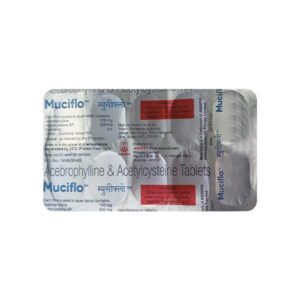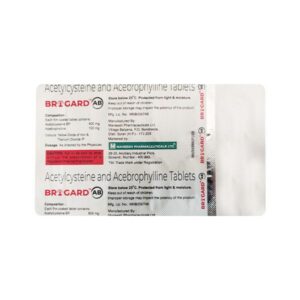ACEBROPHYLLINE + ACETYLCYSTEINE
Acebrophylline: Acebrophylline is a medication that is commonly used for the treatment of respiratory disorders such as asthma, chronic obstructive pulmonary disease (COPD), and bronchitis. It is a combination drug consisting of theophylline and ambroxol.
Theophylline works by relaxing the smooth muscles in the airways, allowing for easier breathing. It also suppresses the body’s response to substances that trigger asthma and COPD symptoms, such as allergens or irritants. Ambroxol, on the other hand, helps in breaking down mucus and clearing the airways.
The recommended dose of Acebrophylline can vary depending on the severity of the condition, but it is typically taken orally as a tablet or capsule. The usual dose for adults is around 100-200 mg, taken 1-2 times a day. However, it is essential to follow the instructions provided by the healthcare professional regarding the dosage and duration of treatment.
Like any medication, Acebrophylline may cause some side effects. Common side effects include nausea, vomiting, stomach upset, diarrhea, headache, and dizziness. These side effects are usually mild and temporary. However, if any severe or persistent side effects occur, it is important to seek medical attention.
Acebrophylline is generally well-tolerated, but it is not suitable for everyone. Individuals with a known hypersensitivity to the drug or its components should avoid using Acebrophylline. Patients with a history of gastric or duodenal ulcers, severe liver or kidney dysfunction, or cardiac arrhythmias should also use caution and consult with a healthcare professional before taking this medication.
It is important to note that Acebrophylline is a prescription medication, and the information provided here is for general knowledge only. It is always recommended to consult with a healthcare professional for personalized advice and guidance regarding the appropriate use of this drug.
Acetylcysteine: Acetylcysteine is a medication that is used in the prevention or treatment of certain conditions involving mucus build-up in the respiratory tract and to counteract the harmful effects of acetaminophen overdose.
Its mechanism of action involves acting as a mucolytic agent, meaning it breaks down and thins mucus in the airways, making it easier to cough up. It does this by breaking the disulfide bonds that contribute to the viscosity of mucus. Additionally, acetylcysteine has antioxidant properties, which can help protect against the toxic effects of certain substances, such as acetaminophen.
Acetylcysteine can be administered orally, by inhalation, or intravenously, depending on the condition being treated. For respiratory conditions, the typical adult dose ranges from 600 to 1200 mg daily, divided into two or three doses. In cases of acetaminophen overdose, the dose may be higher and administered intravenously as directed by a healthcare professional.
While generally considered safe, acetylcysteine can cause some side effects. Common side effects include nausea, vomiting, and a rotten egg-like odor from the medication itself. These side effects are usually mild and temporary. In some cases, acetylcysteine can cause allergic reactions, such as rash, itching, and swelling. More severe allergic reactions are rare but can occur, and immediate medical attention should be sought if any signs of a severe allergic reaction occur, such as difficulty breathing or swelling of the face, lips, or tongue.
It is important to note that the information provided here is a general overview and should not replace the advice of a healthcare professional. Always consult with a doctor or pharmacist for personalized information and guidance before starting or changing any medication.


